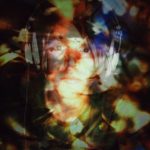You lie face up on a hard, green foam mattress. The lighting above is sharp, like a strip light, but your eyes are shielded from the glare by tinted protective glasses that look like ordinary swimming goggles. You are motionless, but your every muscle is so tense you could shake violently at the slightest change in temperature or any sudden peripheral movement. Above you, the surgical team carefully gather their implements, wash their hands and prepare a local anaesthetic. Each time one of the three figures passes, you stare pleadingly. Your head is pounding. However, the masked figures do not catch your eye.
It’s hard to say what Barberos‘s third album is for. It was launched as part of the closing party of Liverpool Music Week on 4/11/2016, but it’s not music you could dance or sing along to. You wouldn’t run to it for fear of pulling a muscle. You probably wouldn’t sit down and just listen to it. In another context, the spoken vocals on ‘Hoyl’ might be unsettling, but here the warmth of a human voice is comforting. To their credit, Barberos do not pretend to care about your day.
Perhaps it’s music to which one can play god. The synth and drums attack would have made perfect sense leading fledgling civilisations to ruin in Age of Empires or drowning Sims in their swimming pools. ‘Timur’ is named after a fourteenth century warlord who conquered much of the Middle East, but failed to establish the infrastructure that may have stabilised his empire after his death. The stop-start rhythms of the piece are tense, yet the keys ripple mischievously. The crackly mutterings and heavily distorted bass of ‘Obladen’ are ominous, but the album is characterised by a precise playfulness. It has a wealth of ideas and revs impatiently rather than settle in a groove for too long.
On 6/1/1965, a failed medical student named Bart Huges used a dentist drill to bore a hole into his skull. “The trepanation holes in each of the many skulls found together in Peruvian tombs,” he wrote, “shows that the operation was part of the initiation into a higher caste.” If made available to all consenting adults, Huges was sure that trepanation could cure mankind of religion and strike a fearsome blow against our greatest enemy: gravity.
It would be easy to denounce trepanation as the barbarism of a pre-civilised society. However, the success of many operations, even before knowledge of germs and the importance of sterilisation, suggests its practitioners have long been skilled medical professionals. Indeed, Huges was careful to state that the procedure should only be carried out “with today’s knowledge of operating techniques.” He also recommended that people keep their blood sugar levels up and eat salad every day.
Barberos have a less gruesome means of performing brain salad surgery. Anything can be projected onto the lycra bodysuits the trio wear on stage; and from this new album, it’s tempting to imagine them carefully performing sterile acts of mad surgery in a disused hospital.
Barberos was released on 5/11/2016




